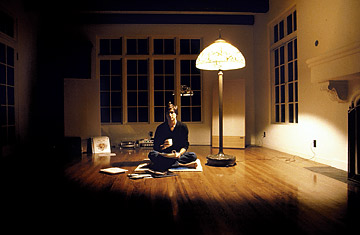
Jobs at home in Cupertino, Calif., on Dec. 15, 1982
(2 of 2)
Jobs didn't stay relevant by changing with the times so much as by sticking to his principles until the rest of the world caught up with them, along with the capabilities of processors, displays, communications components and other technologies. In the 1970s, he thought the Apple II should be a consumer's electronics device rather than a piece of computing equipment, and he was willing to strip out features people thought they wanted rather than do them badly. It worked then, and it worked a generation later when the iPad sprung from the same philosophy.
If he hadn't been so unimaginably stubborn, the world would be a meaningfully different place today. It wasn't all that long ago, for instance, that some "experts" believed Apple should ditch the Mac and start building fancy Windows PCs — a strategy that might have helped the company's bottom line in the short run but would have snuffed out the iPhone and iPad before they even existed.
For all of the simplicity of Jobs' instincts and the undeniable success of the products that resulted from them, he still confuses people. A meaningful percentage of Apple observers find the magnitude of the company's success over the past decade impossible to process. They remember the Jobs who was squeezed out of Apple in 1985, the one who appeared to have lost the PC wars to Microsoft's Bill Gates, the one who in 1997 returned to an Apple so fragile that some pundits thought the main question was whether he'd be able to prop it up for a few more years.
Jobs never stopped being a control freak, but anyone who still thinks that was a liability stopped paying attention years ago. And anyone who still believes that the typical Apple customer is a Steve Jobs Mini-Me should visit an Apple Store and spy on the consumers milling about. They look like real people of all sorts to me, not style-obsessed cultists.
For years, the conventional wisdom on Jobs' relationship with Apple was that his micromanaging ways had left it in shaky condition to thrive without him. The fact that it flourished over the past three years, during Jobs' two extended medical leaves, suggests that wasn't true. Under the new CEO, Tim Cook, the company stands an excellent chance of continuing to be vital, profitable and influential for years to come.
Apple has every reason to be proud of its co-founder's dazzling legacy. But if it ever spends too much time celebrating it, we'll know it's lost its way. May it continue, like Steve Jobs, to find only brief moments of satisfaction in the way things are and have been — an edgy, dissatisfied company less interested in its current success and storied past than in its boundless potential.
Read more about the life and legacy of Steve Jobs in the tribute book from TIME — Steve Jobs: The Genius Who Changed Our World
